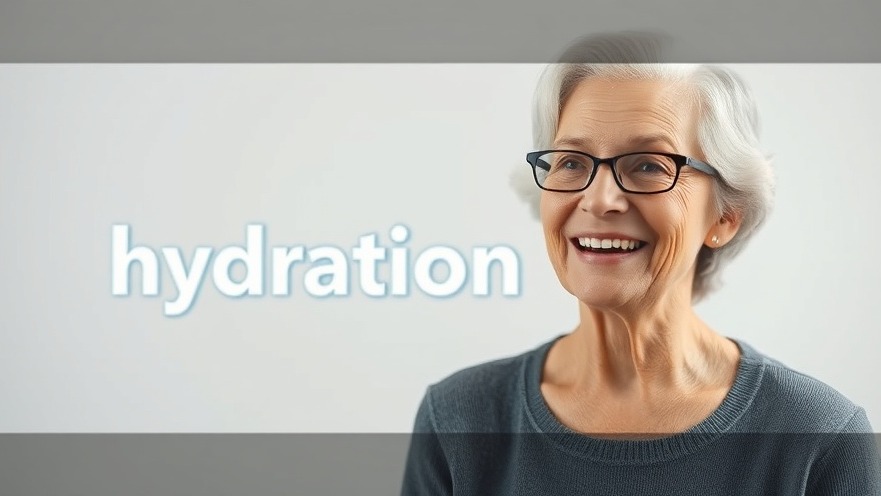
Water: The Essential Element for Brain Health
When it comes to maintaining mental sharpness and emotional well-being, hydration plays a crucial role. Water is not just essential for physical health; it significantly impacts brain function, mood, and overall mental health. As we age, it becomes increasingly vital to pay attention to our hydration levels, making water your mind's best friend.
In 'Hydration and Brain Function: Why Water is Your Mind's Best Friend,' the discussion dives into the vital role water plays in mental health, exploring key insights that sparked deeper analysis on our end.
The Connection Between Hydration and Mental Clarity
Research shows that even mild dehydration can lead to complications like fatigue, confusion, and irritability. For middle-aged adults and seniors, the body’s natural thirst sensation diminishes, making it easy to ignore the need for hydration. A well-hydrated brain supports cognitive function, enhances memory, and can even mitigate symptoms of depression and anxiety. As fluffy as it sounds, drinking plenty of water aids in maintaining a clear mind, helping you navigate daily tasks with ease.
Identifying Your Personal Hydration Needs
Your hydration needs can vary based on age, activity level, and overall health. A general guideline is to aim for 8 to 10 cups of fluids a day, including water, herbal teas, and other low-calorie beverages. Additionally, incorporating foods with high water content, like fruits and vegetables, can contribute to your hydration goals. An essential part of mental health and self-care routines, drinking adequate amounts of water helps rejuvenate your mood and keep your energy levels up.
Beyond Water: Holistic Approaches to Mental Wellness
While hydration is essential, the relationship between water and mental health is just one aspect of a comprehensive approach to well-being. Combining hydration with other practices enhances your mental health routine. Here are some effective techniques:
Mental Health Meditation: Dedicate time to daily mindfulness meditation. This practice encourages mental clarity, reduces anxiety, and promotes relaxation.
Sleep Hygiene: Prioritize restorative sleep by creating a relaxing bedtime routine. Good sleep hygiene supports your brain's functioning and mental health.
Anxiety Relief Exercises: Gentle physical activities such as yoga or walking can be powerful stress relievers while also boosting hydration levels as you walk and sweat.
Breath Control Techniques: Engage in breathing exercises that help calm the mind. Deep, mindful breathing can reduce stress and impart a sense of tranquility.
Common Misconceptions About Hydration
Many people assume they only need to drink when thirsty, but older adults should be aware that thirst signals may be diminished. Additionally, some believe that caffeinated beverages are sufficient for hydration, but these can have a diuretic effect, potentially leading to greater fluid loss. Understanding these misconceptions is crucial for leaders in the senior community who are aiming to promote better hydration habits.
The Importance of Building Healthy Routines
Developing a consistent hydration routine is vital. Set reminders on your phone or keep a water bottle nearby to encourage regular intake. By integrating simple changes into daily habit loops, like drinking a glass of water with every meal, you can seamlessly boost your hydration levels. This practice not only enhances cognitive function but can also support emotional resilience during stressful times.
Recognizing Signs of Dehydration
Being aware of the signs of dehydration can help make proactive changes. Symptoms can include dry mouth, fatigue, dizziness, or headaches. If you notice any of these, it’s a sign to up your water intake. For mental health practitioners and family members caring for seniors, recognizing these signs can be critical to ensuring well-being.
Practical Hydration Tips for Seniors
Here are some practical tips tailored specifically for seniors:
Carry a reusable water bottle to sip throughout the day.
Infuse water with fruits or herbs for added flavor and appeal.
Set hydration goals and track your progress to stay motivated.
Pair drinks with meals or snacks to increase fluid intake.
By changing the way we view hydration, we can foster a healthier approach to our mental fitness. Water not only quenches thirst—it fuels brainpower, lifts spirits, and promotes a holistic wellness lifestyle.
Conclusion: Embrace Hydration as Part of Mental Wellness
In cultivating a routine for an enhanced mental wellness lifestyle, putting forth efforts to stay well-hydrated is essential. Both for motivation and overall function to maintain mental clarity, hydration should be front and center in every senior’s self-care menu. So, remember, when you think of your mental health, think hydration!
 Add Element
Add Element  Add Row
Add Row 




Write A Comment